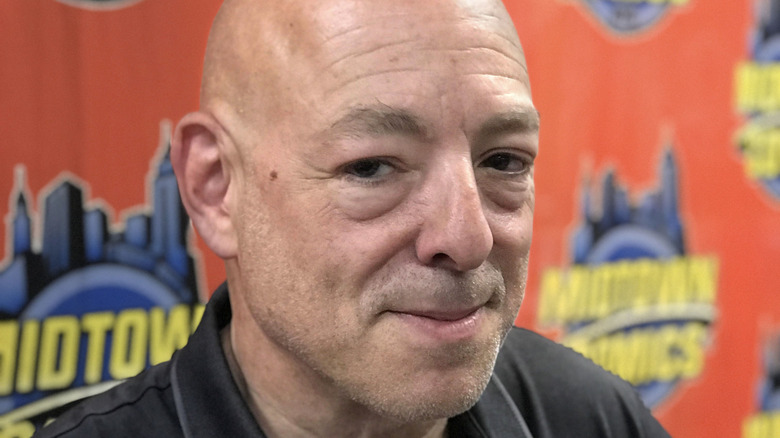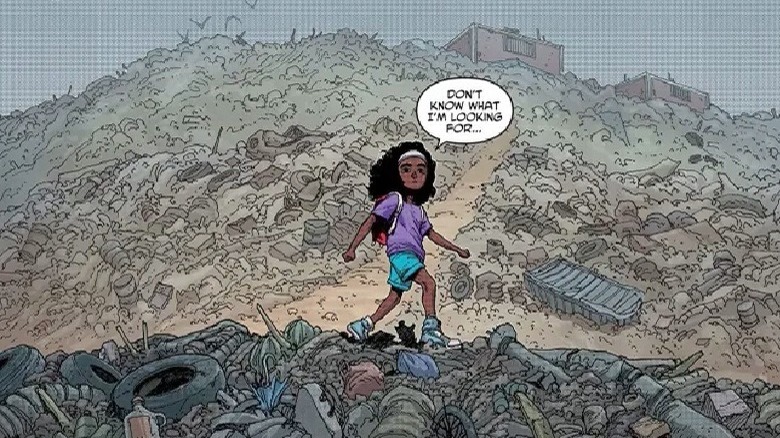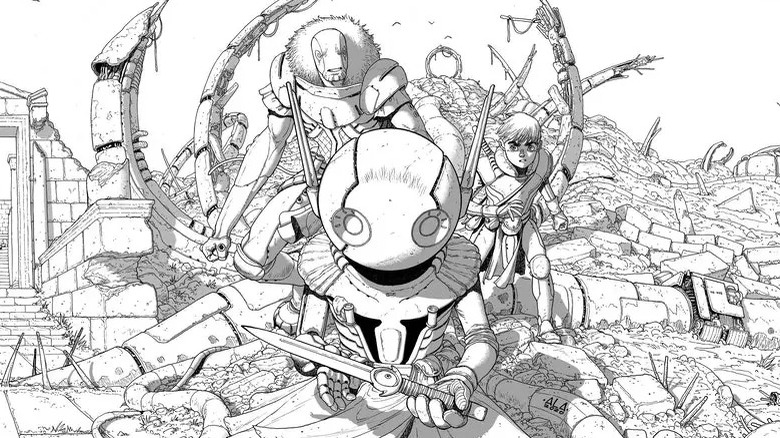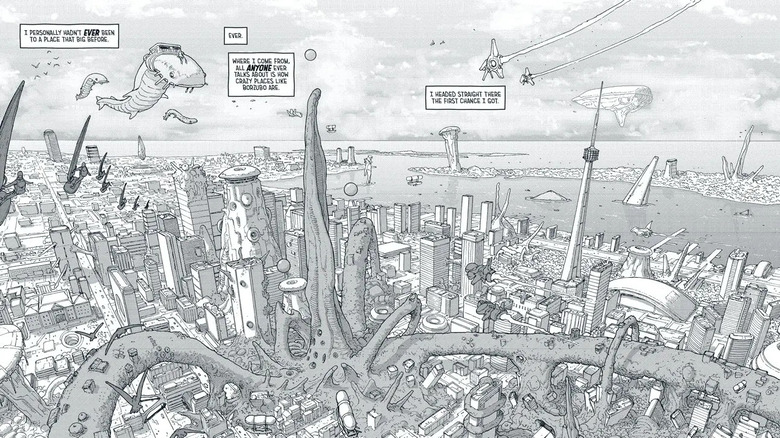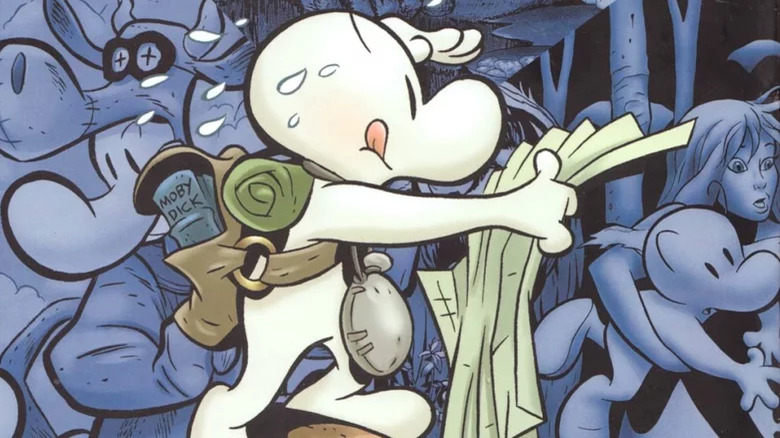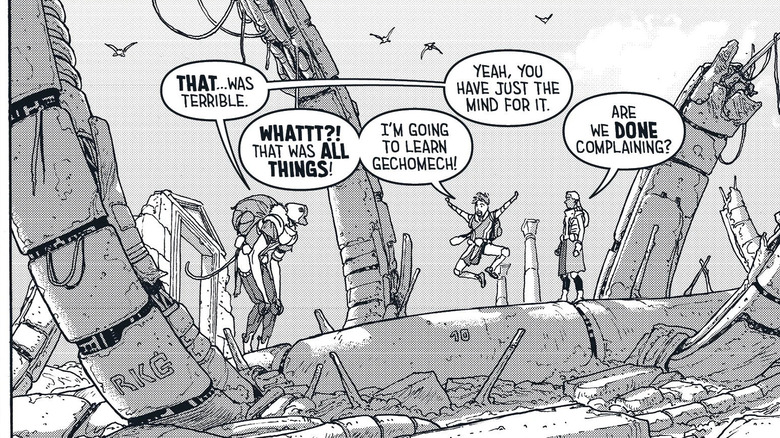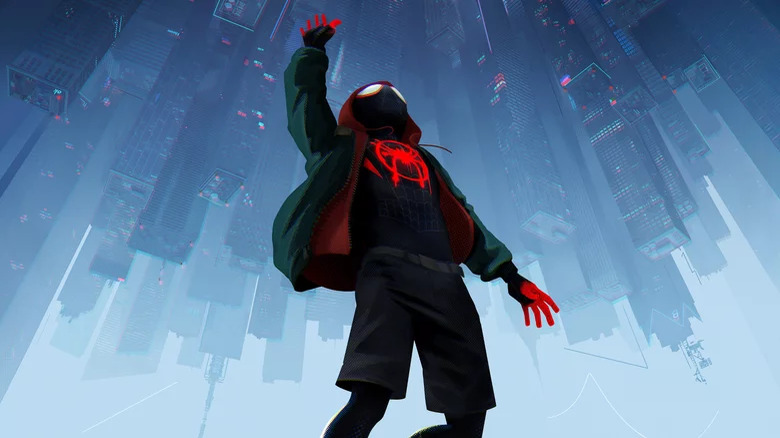Brian Michael Bendis And André Lima Araújo On Expanding Minds With Phenomena - Exclusive Interview
Brian Michael Bendis ("Powers," "Ultimate Spider-Man," "New Avengers") and André Lima Araújo ("A Righteous Thirst For Vengeance") have made huge impacts on the comic landscape in their storied respective careers. The pair are now pivoting to firmly original territory with their newest collaborative effort, the creator-owned and independent comic outing "Phenomena: The Golden City of Eyes" (the first of a planned three-volume narrative).
The narrative, an original story aimed for the YA comic market, follows the young boy Bolden and his powerful friend Spike as the pair traverse an Earth that's been changed forever by a major unexpected phenomena. We explore a world that's both reminiscent of the one we know and wildly different, and the reader will go through an eventful process of discovery as the two explore this wholly original world.
In an exclusive and wide ranging new interview, we spoke with Bendis and Araújo about the new project's roots and inspirations, the depth of its thematic elements, their hopes for the YA audience, and more.
The pieces started to come together
How did you two come to collaborate together on "Phenomena?"
Bendis: ... When I was heading over to DC and all this opportunity was opening up for me to grab some people and say, "Hey, what do you want to do?" André was one of them ... André's work said he was going to do something interesting with the future of DC comics. We did a piece in "Legion [of Super-Heroes]: Millennium" and then we did some stuff in "Young Justice."
Beyond him being perfect for the gig we were hiring him for, on the back burner I was thinking, "We can see if we work well together, we can use some DC page rate and see if this clicks as much as I think it would." It did. We started talking and I asked him, "Hey, what do you want to do? What's the dream? What do you got?" He showed me all this work he had been developing.
Araújo: Because [Brian] was well positioned at DC, we could have done "Batman" or "Superman," and I was all into doing creator-owned stuff ... I sent him my pitches.
Bendis: They were all really good. They were beautiful. He had sent them to me all at once — it was six or seven if I'm not mistaken or something like that, but it was a lot of work.
Araújo: I think eight.
Bendis: You put them all together, because that's the way I saw them. I'm like, "You got yourself a world here, buddy! You got yourself a whole landscape, of which we could really build some mythology, and characters, and whatnot." From there, we started cooking. I threw some very simple ideas for some characters at him to get the ball rolling.
Lo-and-behold, things started clicking really fast and all the pieces started coming together. ... I figured out, because Andre was building it brick-by-brick so clearly, that my job was [to] prompt and get out of the way. Give enough to set the wheels, and then back off. That's what we did, and that's what we're doing right now on Volume Two.
Avoiding labels and letting Phenomena be its own thing
I like how the series takes place after this mysterious event that changes the entire world very rapidly, and that's the way it is. That setup creates a lot of possibility, but how did you land there?
Bendis: This is pre-pandemic, and I was thinking a lot about the kind of fiction and fantasy, or sci-fi fiction that was going on, and what I personally connect to and what I don't. Also, some of it was looking at André's work and it made me feel a certain way, so I leaned into how that stuff felt. [For] most of the development of our world and our characters, we didn't label anything. We didn't say "it's fantasy," or sci-fi, or if it's for kids or if it's for adults. We were like, "Let it grow and be its own thing."
Araújo: Actually, that description that Jeff gave, those two lines were pretty much your initial after you saw my pitches. ... I remember that Brian ... encouraged me to start drawing stuff for this. Based on that only, I started drawing a lot of drawings and characters. He asked for a boy and a creature. We had a bunch of stuff already drawn, and we had our world visually defined before Brian picked all of that stuff up and started writing the plot. ... We didn't set out to do a YA book. Brian was the one that started pushing us both a bit more ... towards the less violent stuff. We both got on that track later on.
Bendis: ... I don't appreciate all my choices later on, but this one I'm still proud of. It was a unique collaboration, trying to figure out how best to get André to just do what André wants to do, and still give it the narrative structure and the characters that you need to care about. We talk often between us about how many truly beautiful films and comics come out that no one actually has any passion for, because there isn't any character to hook on to.
There's not a quest, something as elegantly simple as Luke Skywalker standing there for you to go, "Yeah man, do it. Do that thing you want to do." [The task was] leaning into the lessons that we've learned from all of our storytelling heroes, making sure our character's quests are clear, but unique.
Choosing black-and-white for the world of Phenomena
Bendis (cont'd): The way you talked about how we discover where we are, that was a big one for me — not doing the opening Star Wars scroll of "in a world, where 'Phenomena' phenomena'd, we phenomena the 'Phenomena.'" I wanted to open up and figure out what's the most elegant way to say "s*** went down." This is where the pandemic really helped because I whittled it literally down to the word pomegranate, like, "It's Earth, they're pomegranates. This is us." It's an evocative word.
Hopefully that'll take you with us. Now, we're going to find out what happened in the third volume. It's a three-volume journey. We had a little bit of that privilege that we could now really set the table, and tell the story the way you would hope, which is boldly, and leaning into the audience's intelligence and not having to spoon it out to them.
We'll give it to you, I promise. We'll give you everything you need when you need it. Have fun. There's so many YA universes that do that so well, like "Avatar: The [Last] Airbender." ... I felt very emboldened by it. Also, the idea of doing it in black-and-white was very exciting to me and I was so grateful that André was on board with that idea as well ... there's another visceral experience with his work in black-and-white. I got to see it all the time and I was like, "Let's do that."
Araújo: Brian proposed that to me, which I thought was amazing because it hadn't occurred to me at [that] point, and I always wanted to do a black-and-white book. I did a book back in the day called "Man Plus" that I wrote and drew, and I wanted that book to be black-and-white. The publisher didn't want [that] because in color it sells more, and it didn't sell anything anyway ... [it] might as well have been black-and-white!
Bendis: I came up in the '90s making black-and-white comics. That was my bread and butter for a decade. It was a decade of people saying things to me like, "Are you ever going to finish it?" Like it's somehow incomplete even though I was fully working in the language of film noir. There's nothing to add to it.
Finding something original for the YA market
Let's talk a bit more about "Phenomena's" aesthetic influences.
Bendis: I was embracing the black-and-white aesthetic with everything I had. It wasn't just me; it was a lot of my friends at the same time. Steve Lieber was on "Whiteout," and we would all hear the same critique, that it was somehow unfinished work, and it was a bummer. Then, over time, the culture corrects itself. Manga, and "Bone" and "The Walking Dead" and "Sin City" ... there's enough out there where people do not have some kind of aversion towards black-and-white. I'm like, "Now [they like it], sure." I was excited to go back to that, but with this thing that I'm not seeing. ...
When you see all the Raina [works] and "Captain Underpants" and "Dog Man," there are a lot of books out there that are a lot like those books. Those are the gold standards; there's a lot of people trying to copy that aesthetic. Every time I see something else, I get very excited about it ... I thought, "André could really be that for some young readers." ... That blend of the European, and manga, and all that could really open up the eyes of a young reader who's looking at a comic for the first time and seeing all the possibilities.
Araújo: Most of my reference, in terms of what comic books look like, comes from Europe and from Japan. I always grew up with all that stuff, and black-and-white always looks spectacular. Right now, in the United States, you have basically two sides of comics. You have the specialized market with the floppies, and Marvel, and DC and all that, and then you have all the other stuff that's selling much more, which is the other market, full of manga, and that's in bookstores and not in specialized stores.
The audience, because it's less specialized as well, is more accepting of different styles. ... I'm not dissing the specialized market of comics; we all love it, but it is what it is. A book like this won't have any problems in finding acceptance because it's not [in] color because it's in a market that's used to getting all kinds of stuff.
Bendis: It's like, "This is what we want to do, this is how we want to present ourselves", and hopefully people will dig it.
Society works better when we're all listening to each other
I love the emphasis on the importance of narrative and story. What is your take on the role of story and narrative in this world?
Bendis: That's a real world theme that I wanted to apply here. I'm not going to shock anybody with the philosophy that society works better when we're all listening to each other, and all experiencing each other's joy and pain. ... I have lived through times where everyone was reaching towards each other, and I've lived through times where people were pushing each other away, and it always seemed to be, "Boy, if you really listen to each other's stories, I bet you'd hug each other at the end."
In a moment I thought, "What's the further version of that?" It's that, "Your story is your value." ... And in a world of more fantastical things [that] are happening every time you turn your head, wouldn't the truth of your story be the juiciest part?
Wouldn't that be the thing people wanted the most from you? Wouldn't it be interesting if somehow you could sustain yourself in the world based on your good actions? ... It's interesting how many people talk to me and André about that part of the story. I was interested what the response would be to it and it's been consistent. It's really interesting.
Araújo: Everyone speaks about it.
Bendis: Yeah, everyone.
Araújo: ... It's one of my favorite bits of the story because it is where the value is, like Brian was saying. Back in the day, a few generations ago and all the way through history ... [there are stories of] the stranger that would come into town, and will tell stories and people feed him, for example. That's portrayed in our book as well, things like that. You exchange your story for a roof over your head for one night, and a bit of food, and that stuff is precious, and is very human I feel.
Our trade is storytelling. It's almost a meta bit that we got in our book, where we sell you a story where people are selling stories. That's a good connection, an all around thing that ties everything together.
Bendis: ... Another theme that has been in my work over the years in different places is how a legend can follow you. It's almost the same thing as Eliot Ness. [He] came to Cleveland and he was famous for something he didn't do. It never happened. That's not what the public thought. I was always fascinated by that idea that a legend can follow you and be twisted and come out of your hands a little bit.
'Miles Morales is a hug that never stops in my life'
You've created things within established comic canons and you've built your own original worlds. Can you talk about the differences?
Bendis: They are very different ... There's pros and cons for both. The pros for creating something in a shared universe is that there's already a bedrock of love and appreciation for where we are. If you can find it within yourself to add something that brings a lot more to that thing, people really do celebrate that ... Miles Morales is a hug that never stops in my life. It never stops. You can add things into the shared universe where people go, "Don't do that. [It's] our thing that you pooped all over."
For those of us addicted to a collaboration, a shared universe can create a lot of improv style collaboration where you're "yes-anding" with not only the people you're working close with, but both the other authors that are working on the different titles. You're "yes-anding" all over the place and you can end up writing things you know in your heart you would've never thought of on your own. That's the best. That's top tier zenith collaboration for that.
On the other hand, creating something from damn scratch when there's nothing there, and reaching for something you're not seeing anywhere else ... that's the whole point of creating something from scratch. Of all the universes and fantastical places that I've been taken from all my streaming services and all my publishers, I still think, "I have something that I want to build here with my friend." It has value beyond the point of the story.
By doing that, you're taking a swing. You're asking people to join you for something they didn't even know they wanted. That's a different ask than, "You like Spider-Man, right?" ... It's a huge ask. It's very scary. You can do everything right and nobody cares. On the flip side, when people do join you for a ride like this, when they do trust you ... it is the best. Honestly, it is an author-audience level of collaboration that fills me.
Picking up a creator-owned comic is seeing the artist's soul
What's it like to work on creator-owned comics?
Araújo: Creator-owned comics is really "the thing." ... Like Brian was saying there, there are lot of pluses with working at Marvel or DC with their characters as well, but I always wanted creator-owned. Comics are different from other mediums, so Brian and I, we did this [as] two of us. That's it. That's all it takes. Two people, or one people if you are writing and drawing.
Brian did his stuff all on his own when he was starting. I did a book already like that as well. You can sit down and do a comic on your own, creating and controlling all aspects ... You can create and control the book in a way that you can tell your story, put yourself out there and show what you are.
If you want to see what an artist is, particularly in comics, you pick up a creator-owned comic from [them] and you will see [their] soul. It's right there. It's like we are standing naked in front of you — that's the same thing. It's the most appealing thing. It's an ability to express ourselves that we could never do with words, speaking to another person.
Bendis: It feels like most of the corporations that own the big, fancy, popular IP are eating it up pretty quickly. They're devouring it, and mashing it up and "Ready Player One"-ing it. All that's fun and cool and I like a lot of it, but we're going to need some new playgrounds. We're going to need some fresh, untouched legends and "Phenomenas" to read to our kids and to share with each other. I am as guilty of multi-versing as anybody in the entire world, but every once in a while, you have to sit down and start from scratch. That's where we are, and I'm really grateful for the people who have already ordered the book and have shared it with us.
Go and make your project, too
Brian, you've had characters adapted for large and small screens. Which character hasn't been adapted yet that you'd most like to see?
Bendis: All of them! I'm not joking. It's such a cheeky answer, but as you will find out soon, I'm going to be in a pretty decent situation with all of that ... Truthfully I have learned, and with some privilege, everything in it's time ... It's been 27 years that Hollywood has optioned "Torso." I would like [it to be made]. I don't mind a 27-year roller coaster if you get a show at the end of it. Same thing happened with "Powers," we went a long ride on "Powers" but we got a show at the end of it, so it was cool.
We have an excellent director, Corin Hardy, attached to "Torso," and I very much hope that does happen. It's been 27 years. I was talking to my film student daughter about it — she's in film school in her 20s and this outdates her. That is shocking to me!
Me and André are very much in the in the thick of things right now, right in the middle of this "Phenomena" world, but I would love if, down the line, André got to put on his fancy European director's hat and found a way to adapt this. Nothing would make me happier. That'd be fantastic.
André and I are having a great time, and some of it can sound braggadocious, but in my heart, I'm trying to say to someone who's listening, "Go make yours, too." I hope this makes you go, "I'm gonna try this. ... Me and my friend, I'm going to go make a song, or make a little film, or make a comic together." That's the point of this, too, on top of buying "Phenomena."
"Phenomena" is available at major book retailers.
This interview was edited for length and clarity.
